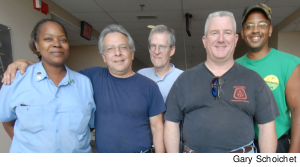 |
On February 2, CUNY was found in violation of a New York law requiring large public employers to develop programs to help prevent workplace violence. The Public Employee Safety & Health Bureau (PESH) found six violations of the law – four described as “serious” – and imposed deadlines ranging from March 21 to July 25 for the university to correct them. The PESH order applies to every CUNY college and administrative site; failure to meet deadlines will subject CUNY to a daily penalty. The University has 60 days to appeal.
TOO LITTLE
Among CUNY’s “serious” violations of the law was its failure to provide for participation by campus unions at various stages in the development of a workplace violence prevention program.
“The standard requires employers to involve members in accessing the risks in their own working conditions,” said Joan Greenbaum, a coordinator of the PSC’s Health & Safety Watchdogs. “The law requires CUNY to ask for our input on unsafe conditions such as working alone, poor lighting, working late hours or handling money, as well as on training staff to cope with potential violence in the workplace, and reviewing the effectiveness of the program. This PESH citation requires CUNY to follow the law.”
The PESH action was a long time coming. New York’s legislature mandated that workplace violence prevention programs for large public employers be in place by the end of August 2009, and required that employers consult with “authorized employee representatives” – in CUNY’s case, staff designated by the unions, not selected by the administration.
At Queens College, the PSC began asking the administration about its prevention program in October 2009. After retired Professor Richard Antoun was stabbed to death in his office on the SUNY-Binghamton campus by a graduate student in December 2009, the union pressed for a response again in January. Finally, at a labor-management meeting in April, the college produced a copy of CUNY’s 2004 policy on responding to workplace violence and announced that it was in full compliance with the 2009 law. The union explained why CUNY was wrong on that assumption and eventually filed a complaint with PESH against the college on July 15, 2010.
In the last days of July, the University released a draft for a new policy on workplace violence to the three largest unions at CUNY – the PSC, American Federation of State, County and Municipal Employees (AFSCME) District Council 37, and Teamsters Local 237 – and asked for comments prior to implementing the policy on August 2. All three unions objected to the content and to being given mere days to respond.
The day after Labor Day, PESH conducted a two-day inspection at Queens College in which it became clear that the college and the University expected to rush a program into place without consulting campus unions in any significant way. PESH subsequently expanded the Queens complaint to the entire University.
TOO LATE
By Thanksgiving there was little evidence of any further effort to consult the unions or to implement a program. The union reported CUNY’s lack of progress both to the Department of Labor and to Assemblyman Rory Lancman, chair of the Subcommittee on Workplace Safety (and a Queens College graduate). The University responded by issuing a revised draft program, and directing the colleges to begin site assessments and to survey staff about safety from violence in the workplace. But the assessments were scheduled for dates during intersession, and the online surveys closed before faculty returned to campus. Once again CUNY officials hadn’t attempted to review the 2009 State standard.
BE PROACTIVE
The PESH inspector summoned CUNY officials to a meeting on January 4, and determined that there was still no program, and no provision for consulting the unions.
In the wake of the citation, CUNY Trustees are preparing to meet the first deadline by adopting a brief policy statement on preventing workplace violence at their February 28 meeting. Union activists describe the policy as “vague,” and say that the University’s compliance will have to be proved at the campus level.
“Contact your local union chapter get more information on the risk assessment walk-throughs and the reviews,” said Greenbaum. “In our work areas, PSC members are the best experts about the conditions where we work. We know the most about what may be unsafe.” (For further information or training, contact the PSC Health & Safety Watchdogs at [email protected].)
After the 2007 Virginia Tech shootings, everyone in the country knew that colleges had to become more proactive about violence in the academic workplace. And in New York State, after the SUNY-Binghamton professor’s killing, PESH cited the school for failing to implement a prevention program.
Why has the City University been so slow to implement a workplace violence prevention and policy program? “Perhaps CUNY management thinks that union involvement somehow infringes on their prerogatives? The only prerogative that appears to be at stake is management’s right to refuse to take responsibility for its errors and omissions,” said Ben Chitty, a PSC Health & Safety Watchdog at Queens College. “When safety is at risk,” he continued, “this prerogative is not worth spit.”
“CUNY must now implement a workplace violence prevention program at every work site,” said Chitty. “The union will participate in its development, implementation, and review, and we will all be safer for it.”

